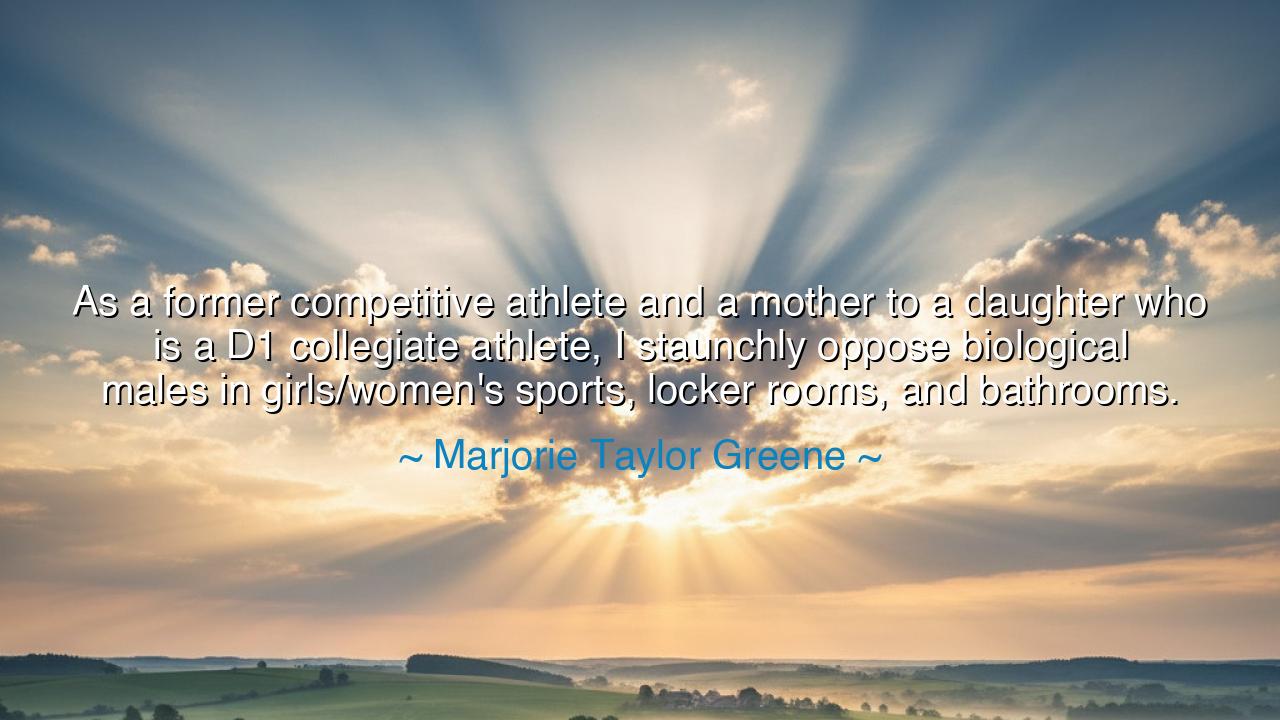
As a former competitive athlete and a mother to a daughter who
As a former competitive athlete and a mother to a daughter who is a D1 collegiate athlete, I staunchly oppose biological males in girls/women's sports, locker rooms, and bathrooms.






Marjorie Taylor Greene declared: “As a former competitive athlete and a mother to a daughter who is a D1 collegiate athlete, I staunchly oppose biological males in girls/women’s sports, locker rooms, and bathrooms.” Whatever one’s agreement or disagreement with her words, they resound with the voice of a mother, an athlete, and a guardian. Her statement is born from a deep conviction that fairness, protection, and justice must be upheld in the spaces where women strive, compete, and grow. It is a cry not only of politics, but of passion—for sport, for family, and for the dignity of womanhood.
To understand this saying, we must first recognize the weight of sports in human life. Athletics is not only a contest of strength and skill; it is a proving ground of equality, discipline, and honor. For centuries, women had to fight for their rightful place in these arenas, their victories often won not on the track or field, but in the courts of law and the struggles of society. Greene speaks from this legacy, from the perspective of one who has felt the rigor of competition, and of a mother who has seen her daughter rise to the demanding heights of Division I athletics, a pinnacle where only the strongest endure.
Her opposition to biological males in women’s spaces stems from a fear that the hard-won progress of female athletes might be undone. She sees in such inclusion not the blending of fairness, but its rupture. To her, women’s sports exist as a sanctuary of equity, where women may stand against women as equals. The concern is not only for the trophies on the shelf, but for the soul of competition itself, which falters when one group feels overshadowed or unsafe. Whether one agrees or not, her conviction is rooted in the belief that justice prevails only when the field is level.
History offers examples of similar struggles for fairness. Consider the passage of Title IX in 1972, a landmark in American law that required equal opportunity for women in educational programs, including sports. Before Title IX, young women often trained without resources, uniforms, or recognition, while their male counterparts flourished. Title IX was the shield that carved open the gates of equality, giving rise to generations of female athletes who could finally compete with dignity. Greene’s words stand within that tradition: a reminder that what is given by law and struggle must not easily be surrendered.
Yet the matter is also deeply human. Greene does not speak as a legislator only, but as a mother, whose heart is tied to the safety and thriving of her child. In the ancients’ eyes, the role of a mother was both fierce and sacred, for she stood as protector of life, honor, and destiny. Her words carry this same tone: a maternal shield raised high to guard what she perceives as threatened. It is not an abstract battle, but one woven into the story of her family, her daughter, her flesh and blood.
This is not a call without controversy. In the modern age, debates over identity, fairness, and inclusion stir fierce storms. Voices rise on both sides, and the truth is often tangled in passion. Yet from Greene’s statement emerges a universal reminder: every generation must grapple with how to balance justice and compassion, fairness and inclusion. The ancients themselves faced such struggles when new peoples, new customs, and new voices sought entry into old traditions. These moments demand both courage and wisdom.
Therefore, the lesson is this: in every conflict of society, guard both the fairness of competition and the dignity of individuals. Do not dismiss the fears of parents, nor silence the hopes of those seeking recognition. Seek truth with clarity, speak with conviction, and above all, hold fast to the principle that justice must be firm, yet compassion must not be forgotten. For if sport is the mirror of life, then how we treat its contests reflects how we will treat each other.
So let us act wisely: protect fairness, honor the struggles that won equality for women, and yet listen with patience to those whose lives and identities seek place in the world. In this balance lies the path of peace. For only when justice and compassion walk side by side can the games of humanity endure, unbroken and uncorrupted, for the generations yet to come.






AAdministratorAdministrator
Welcome, honored guests. Please leave a comment, we will respond soon